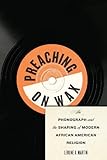Preaching on wax : the phonograph and the shaping of modern African American religion / Lerone A. Martin.
Material type: TextSeries: Religion, race, and ethnicityPublisher: New York : New York University Press, [2014]Description: 1 online resource (xvii, 243 pages .)Content type:
TextSeries: Religion, race, and ethnicityPublisher: New York : New York University Press, [2014]Description: 1 online resource (xvii, 243 pages .)Content type: - text
- computer
- online resource
- 9780814707999
- 0814707998
- African Americans -- Religion
- Phonograph
- Radio broadcasting -- Religious aspects
- Noirs américains -- Religion
- Électrophones
- electrophones
- RELIGION -- General
- SOCIAL SCIENCE -- Ethnic Studies -- African American Studies
- PERFORMING ARTS -- Radio -- History & Criticism
- RELIGION -- Christian Life -- Social Issues
- RELIGION -- Christianity -- General
- African Americans -- Religion
- Phonograph
- Radio broadcasting -- Religious aspects
- Schwarze
- Mission
- Phonograph
- Hörfunk
- USA
- 261.5/208996073 23
- BR563.N4 M37 2014eb
- REL000000 | SOC001000 | PER008010
| Item type | Home library | Collection | Call number | Materials specified | Status | Date due | Barcode | |
|---|---|---|---|---|---|---|---|---|
 Electronic-Books
Electronic-Books
|
OPJGU Sonepat- Campus | E-Books EBSCO | Available |
Includes bibliographical references and index.
"From 1925 to 1941, approximately one hundred African American clergymen teamed up with leading record labels such as Columbia, Paramount, Victor-RCA to record and sell their sermons on wax. While white clerics of the era, such as Aimee Semple McPherson and Charles Fuller, became religious entrepreneurs and celebrities through their pioneering use of radio, black clergy were largely marginalized from radio. Instead, they relied on other means to get their message out, teaming up with corporate titans of the phonograph industry to package and distribute their old-time gospel messages across the country. Their nationally marketed folk sermons received an enthusiastic welcome by consumers, at times even outselling top billing jazz and blues artists such as Bessie Smith and Ma Rainey. These phonograph preachers significantly shaped the development of black religion during the interwar period, playing a crucial role in establishing the contemporary religious practices of commodification, broadcasting, and celebrity. Yet, the fame and reach of these nationwide media ministries came at a price, as phonograph preachers became subject to the principles of corporate America. In Preaching on Wax, Lerone A. Martin offers the first full-length account of the oft-overlooked religious history of the phonograph industry. He explains why a critical mass of African American ministers teamed up with the major phonograph labels of the day, how and why black consumers eagerly purchased their religious records, and how this phonograph religion significantly contributed to the shaping of modern African American Christianity"-- Provided by publisher.
Print version record.
Cover -- PREACHING ON WAX -- Title -- Copyright -- Dedication -- Contents -- List of Figures -- Acknowledgments -- Author�s Note -- Introduction: Phonograph Religion -- 1. “The Machine Which Talks!�: The Phonograph in American Life and Culture -- 2. “Ragtime Music, Ragtime Morals�: Race Records and the Problem of Amusement -- 3. Selling to the Souls of Black Folk: The Commodification of African American Sermons -- 4. Apostles of Modernity: Phonograph Religion and the Roots of Popular Black Religious Broadcasting
5. A New Preacher for a New Negro: Phonograph Religion and the New Black Social Authority 6. “Say Good-Bye to Chain Stores!�: Recorded Sermons and Protest -- Conclusion: Let the Record Play! Communication and Continuity in African American Religion and Culture -- Notes -- Bibliography -- Index -- About the Author
eBooks on EBSCOhost EBSCO eBook Subscription Academic Collection - Worldwide
There are no comments on this title.

